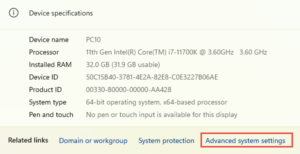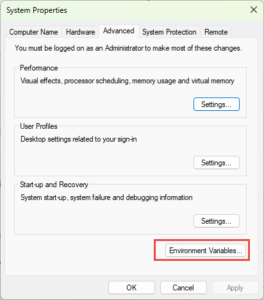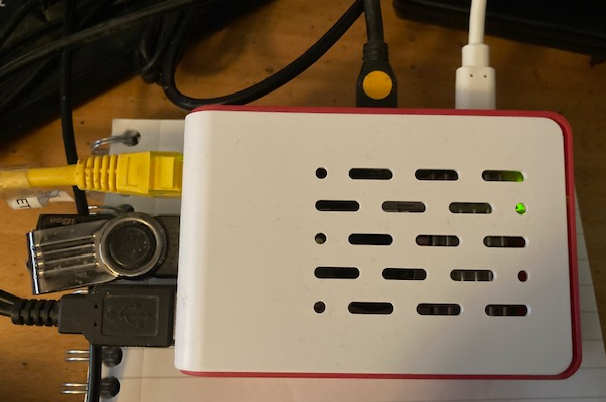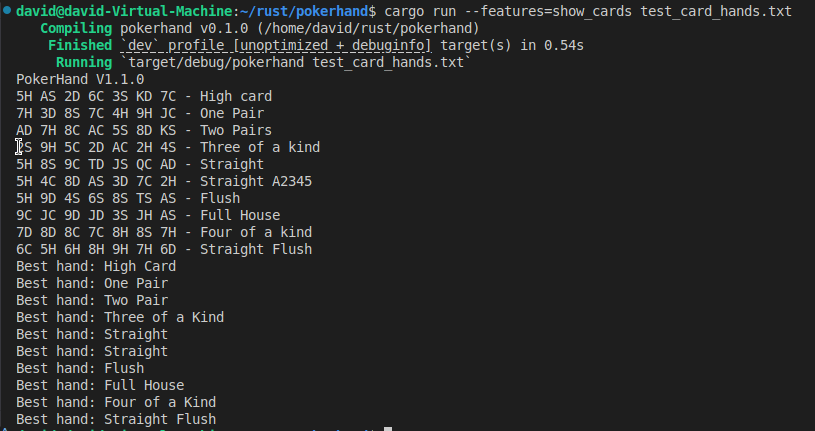 I wrote a Poker Hand evaluator. It read in a file of a 1,000 randomly generated sets of seven cards like this AC 8H JC …and figured out what was the best hand. It’s in Rust and on GitHub. That takes you to a projects folder and the whole rust project complete with two test sets of cards are included. Look for the file Rust_pokerhand.zip.
I wrote a Poker Hand evaluator. It read in a file of a 1,000 randomly generated sets of seven cards like this AC 8H JC …and figured out what was the best hand. It’s in Rust and on GitHub. That takes you to a projects folder and the whole rust project complete with two test sets of cards are included. Look for the file Rust_pokerhand.zip.
Now in the Hand evaluation I used both a HashMap and HashSet. Here for example is the code to count how many of each Rank there are.
let mut rank_counts = HashMap::new();
for card in cards.iter() {
*rank_counts.entry(card.rank).or_insert(0) += 1;
}
The program reads in the cards into a Vec<Vec<Card>> and then calculate the average time to evaluate a hand.
Now there’s nothing wrong with the program. One of the card sets is called test_card_hands.txt and has an instance of each hand type along with a comment.
5H AS 2D 6C 3S KD 7C - High card
7H 3D 8S 7C 4H 9H JC - One Pair
AD 7H 8C AC 5S 8D KS - Two Pairs
You can run that with this command:
cargo run --release --features "show_cards" test_card_hands.txt
Or if you run the other test set with this, it doesn’t show the cards but does calculate the average time.
cargo run --release 1000_card_hands.txt
If I run this on Windows it evaluates a hand in 780 ns on average and on Ubuntu 24.04 on the same PC, (running under Hyper-V), it’s faster typically 550 ns.
So, I was looking for ways to speed it up and thought. The HasmMap and HashSets are running on small numbers of Cards. 13 for Ranks and 4 for suits so what if I use them as arrays. Would it be faster?
It was, roughly four times faster.
As an example, the code above I replaced with this:
let mut rank_counts = [0,0,0,0,0,0,0,0,0,0,0,0,0];
for card in cards.iter() {
rank_counts[&card.rank.value()-2] += 1;
}
That needed a value() method that mapped all the Ranks starting at 2, onto 2-14.
I also redid the code for working out a straight.
The original is this, plus a bit more to check for A2345:
let mut values: HashSet<u8> = cards.iter().map(|card| card.rank.value()).collect();
let mut unique_values: Vec<u8> = values.drain().collect();
unique_values.sort_unstable();
let mut straight_length = 1;
for i in 1..unique_values.len() {
if unique_values[i] == unique_values[i - 1] + 1 {
straight_length += 1;
if straight_length == 5 {
is_straight = true;
break;
}
} else {
straight_length = 1;
}
}
The improved version uses this constant
static STRAIGHTS: &'static [i32]=&[7936, 3968, 1984, 992, 496, 248, 124, 62, 31, 7681];
Plus a binvalue function which maps the card Ranks onto 1,2,4,8 etc. Just or the Cards binValues together and ‘ands’ (&) it with the individual STRAIGHTS values.
let mut bivalue=0;
for card in cards.iter() {
bivalue |= card.rank.binvalue();
}
for i in 0..STRAIGHTS.len(){
if &binvalue & STRAIGHTS[i]== STRAIGHTS[i] {
is_straight= true;
break;
}
}
 As a user of Visual Studio since about VS 5, I’ve become accustomed to being able to debug. With VS Code, it’s also been easy but now that I program in C and Rust, the codelldb extension makes things very easy. You need other extensions: for Rust- the Rust Analyzer extension and for C/C++ the Microsoft C/C++ extension.
As a user of Visual Studio since about VS 5, I’ve become accustomed to being able to debug. With VS Code, it’s also been easy but now that I program in C and Rust, the codelldb extension makes things very easy. You need other extensions: for Rust- the Rust Analyzer extension and for C/C++ the Microsoft C/C++ extension.

 Although it says cannot open input file SDL2.lib, I think the problem is a parameter passed into Link.exe.
Although it says cannot open input file SDL2.lib, I think the problem is a parameter passed into Link.exe.



 I recently bought one with 8 GB RAM pictured above. I haven’t got an SSD for it yet so am still pottering about with an SD Card.
I recently bought one with 8 GB RAM pictured above. I haven’t got an SSD for it yet so am still pottering about with an SD Card.



 Well actually I asked Microsoft’s CoPilot AI and it sorted it!
Well actually I asked Microsoft’s CoPilot AI and it sorted it! This is on Ubuntu 24.04 LTS. I’ve installed the dev versions of SDL2, including images and TTF. You can read how to install them in
This is on Ubuntu 24.04 LTS. I’ve installed the dev versions of SDL2, including images and TTF. You can read how to install them in 
 I wrote a Poker Hand evaluator. It read in a file of a 1,000 randomly generated sets of seven cards like this AC 8H JC …and figured out what was the best hand. It’s in Rust and on
I wrote a Poker Hand evaluator. It read in a file of a 1,000 randomly generated sets of seven cards like this AC 8H JC …and figured out what was the best hand. It’s in Rust and on 